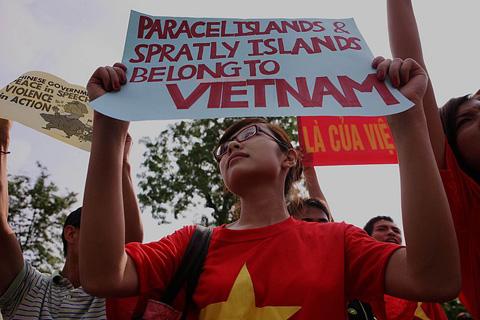(Photo Credit: AFP)
(BGF) – This article, featured in The Washington Post, assesses the reasons behind China’s decision to drill for oil off the Paracel Islands in the South China Sea and how the U.S. should respond. According to the authors, China’s actions are likely motivated by its desire to solidify its nationalistic posture at home by exerting control over the disputed region of the South China Sea or to gain control over the increasingly crowded shipping lanes in the region. The authors go onto posit that China has disguised these intentions under the cloak of a commercial oil exploration. Given China’s true intentions, the authors contend that it is critical that the U.S. call China’s bluff by supporting Vietnam, which the U.S. previously said it would not do, in order to provide stability in the region and to counter China’s aggressive actions in the South China Sea. Click here to read the full article or visit The Washington Post‘s website.
Beijing’s Actions in the South China Sea Demand a U.S. Response
By Elizabeth Economy and Michael Levi
The China National Overseas Oil Corporation (CNOOC) began drilling in Vietnamese-claimed waters last week, accompanied by more than 70 vessels, including armed Chinese warships. At first glance, this might look like merely another front in China’s quest for natural resources, which has taken Chinese companies to seemingly every corner of the earth.
Yet what is happening in the South China Sea is actually far more dangerous than what has come before — and the forces driving it go well beyond pursuit of energy riches. The United States needs to face up to the full magnitude of the Chinese challenge to have any hope of successfully confronting it. This means not only tough talk but also a willingness to take difficult action.
There has long been speculation that massive oil and gas deposits are locked beneath the South China Sea — 1.4 million square miles bordered by Brunei, China, Malaysia, the Philippines, Taiwan and Vietnam and claimed in part by all of them. According to the Chinese Ministry of Land and Resources, the area might contain as much as 400 billion barrels of oil, surpassing the bounties of the Middle East.
Most informed estimates, though, are much smaller. The U.S. Geological Survey estimated in 2010 that the region’s undiscovered oil (much of which will never be financially attractive to produce) totals a far smaller 11 billion barrels. It is difficult to believe that China would risk armed conflict for such modest stakes.
Two other forces are essential to understanding what is going on. One is nationalism: The drilling is taking place near the Paracel Islands, which sit within a disputed area of the South China Sea, roughly 120 miles from Vietnam’s coast and well within Vietnam’s 200-mile exclusive economic zone. But China claims the islands based on historical usage and effective exercise of sovereignty, having occupied them since 1974. Backing off from the Paracels would deal a blow to China’s prestige, while underlining Chinese control over the islands would strengthen the leadership’s legitimacy at home.
Chinese leaders are also motivated by a desire to control the sea lanes of the South China Sea. More than $5 trillion of trade passes through the increasingly crowded waters each year. That includes almost one-third of world seaborne oil trade and more than three-quarters of Chinese oil imports (as well as most of the oil destined for Japan, South Korea and Taiwan). The Chinese navy may be too weak to challenge U.S. dominance in key Middle East sea lanes, or even to exercise control over the critical Straits of Malacca, but by operating naval forces across the South China Sea it can gain greater confidence that the United States will not be able to disrupt its supplies.
Beyond these two motivations, it does not hurt that Chinese oil companies are eager to operate in the region. By cloaking its military excursion in commercial garb, Beijing might have hoped to defuse some of the inevitable opposition.
Click here to continue reading.
